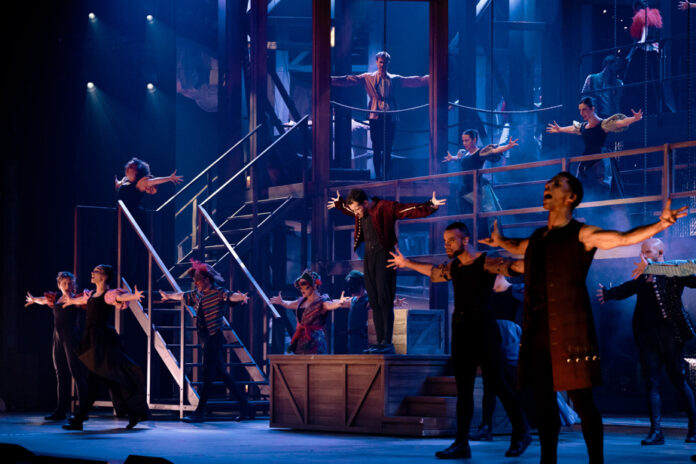Among the crowd of musicals presented this season in Paris, Molière, the musical show stands out since it is the only original creation among the franchises that are The Lion King, Grease, Mamma Mia or even Starmania. It’s also certainly the most “modern” with its mix of earworm songs and hip-hop beats.
The play recounts the tumultuous life of the author of Tartuffe, from the creation of the Illustre Théâtre in 1643 until his death in 1673, following a performance of Le Malade Imaginaire. The creative fervor of Jean-Baptiste Poquelin is the guiding principle, as is his desire for recognition certainly linked to his conflictual relationship with his father, who would have wanted him to upholster the king like him.
The great particularity of this piece which takes place in the 17th century is the bias towards today’s rhythms. Moments that would normally be spoken are instead slams, rap and its movements are the basis of many numbers. The fabulous costumes – there are over 250 of them! – by Jean-Daniel Vuillermoz are also a magnificent mix between evocations of the codes of the time and those of today: goodbye wigs and powdered makeup, hello princess dresses and sneakers, puffed sleeves on camisole black.
We find this kind of joyful anachronisms in the plot, TV journalists and demonstrations, levels of language that overlap between the verlan and the prose of Molière. Separated into two acts, the piece also has a very current and rapid rhythm, a veritable fire from start to finish. The first act, more hectic, follows Molière’s crazy youth in search of glory. The second focuses more on his setbacks with the Church and power, his loves, his victories, his regrets.
Even though the show is large-scale, the stage is immense and the LED screen which serves as a backdrop is just as huge, there is real restraint in the dressing and scenography. We are not here in the flashy decor, but in a certain simplicity, with a large walkway where the singers and dancers circulate, accessories which do not clutter the stage, but which are transported to the according to needs.
Producer Dove Attia, who also wrote the libretto and several songs, makes no secret of it: it was Luis Manuel Miranda’s Hamilton, which revolutionized everything in the United States, which made him want to return to musical comedy and which directly inspired it.
“There is my touch, that of the Sun King, of the Ten Commandments, but there is also this influence of Hamilton, and of Come From Away, which brought something new. I integrated both. »
And it works, especially with young people. “On Saturday and Sunday the room screams! It is a new language, which allows us to show the modernity of Molière, and that his quest is universal. »
All this should not put off fans of “classic” musicals, with all the obvious care that goes into the whole thing and the contribution of earworm tunes, courtesy of Dove Attia. He smiles. “I’m not a great musician, but I have a sense of melody. I love that people hum my songs after the show, that we dream of them in the evening! »
In a context of inflation, production of this magnitude is still a risk. “We’re crazy, we took a huge risk. We didn’t think it would work! But since the first, everything has changed, we are number 1 in all sales thanks to word of mouth. »
The first reviews are also quite positive – the media premiere took place on Thursday – which bodes well for the future. More than 70 performances are planned in Paris until February 2024; the show will then tour the Zénith in France, then go to Switzerland and Belgium.
“Japan, China, Korea are interested. We would like to go to Canada, if Canada wants us,” says the producer, who remembers with a half-smile that his Ten Commandments, even with Mario Pelchat in the lead, had been poorly received here. “I invite all producers to come see this exceptional show! »
PETiTOM, for sure, dreams of coming to play at home. “Instead of bringing translations of Broadway shows, it would be nice, a creation written directly in French! I would be honored to do it in Quebec. Fingers crossed. »





